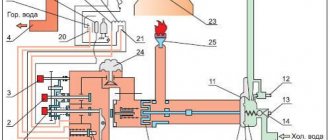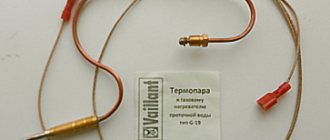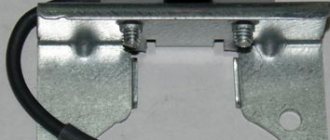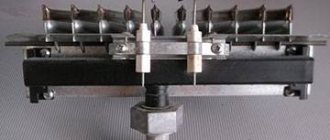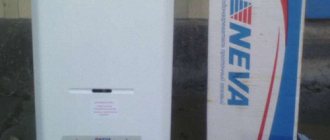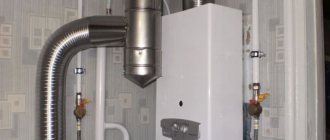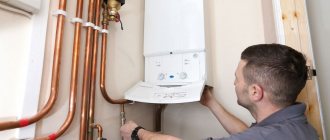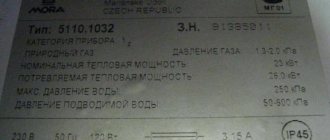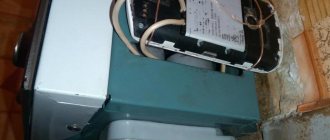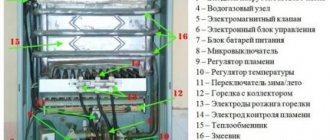The reason that the gas water heater pops strongly when the water is turned on is that too much gas accumulates before ignition.
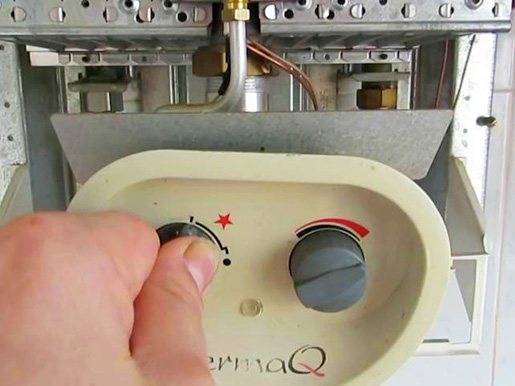
Ideally, the gas should mix with air in a certain proportion and then ignite. If more fuel is supplied, or combustion products are mixed into it, then the flame breaks out with a loud unpleasant pop. To fix the breakdown, it is important to understand why this is happening. All operations for the repair of the water heater must be carried out with the gas valve turned off.
Reason 1 - Poor cravings
The combustion products must be discharged through the chimney. When they are hot and there are no obstructions, it happens quickly. If carbon dioxide and steam have time to cool, they can sink back into the column and contaminate the gas-air mixture.
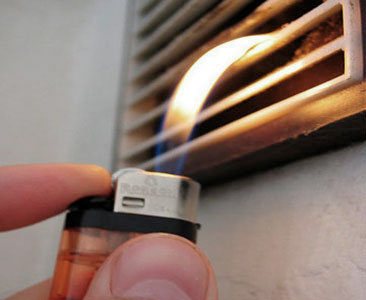

Traction check
To check the intensity of the draft, you need to bring a burning match or lighter to the chimney hole (also in some models there are special control holes for this). The flame should actively deflect towards the water heater. If it stays in place, it indicates poor traction.
The main reason for poor draft is chimney clogging. Over time, soot accumulates in the chimney, which narrows the diameter of the pipes. Debris can also get into the chimney from above. If the blockage is small, you can remove it manually. If the chimney is clogged much higher up the riser, you need to call the utilities for cleaning.
Also, if an active hood with a fan is installed in the kitchen, then the exhaust gas can be drawn into it, in the place in order to go up. It is necessary to turn off the propeller when the water heater is running.
If metal-plastic windows are installed in the room and they are closed, then the lack of incoming air can interfere with the draft. For safety reasons, you should use a gas water heater only with an open window (or with a plastic window open for ventilation).
Why does the igniter of the gas column go out?
There are several reasons why the igniter goes out:
The most common cause for an ignitor to go out is a faulty thermocouple. When the igniter goes out, there is a lack of heat, since there is no fire, the thermocouple detects it and turns off the gas. A thermocouple is an element that is designed to turn off the gas in the event of an intermittent operation of the gas column. But after long-term use, the thermocouple may burn out and its tip will become loose from prolonged exposure to fire. This is what causes the ignition to go out.
If there are any outside air currents, they can blow out the igniter. If the device has inadequate ventilation, then air currents can come from it, which extinguish the igniter. But many confuse such a problem with a lack of traction. Therefore, during the repair, you need to correctly identify the problem.
The gas control system includes solenoid valves. They are arranged in gas water heaters. In the event that ventilation ceases to function, then carbon monoxide begins to flow into the room. And the solenoid valves shut off the gas supply and the igniter goes out.
Over time, black soot settles on the heat exchanger and the area around the igniter. This is another reason for the ignition to go out. As a result of incomplete combustion of the gas, soot is formed. The accumulated soot often causes problems with the air ventilation system. As a result, the ignition is extinguished.
Reason 2 - Batteries are empty
If you have an automatic column that lights up when you turn on the water (for example, Vector JSD 20-W), then the reason that the water heater bangs when you turn on the water may be discharged batteries.
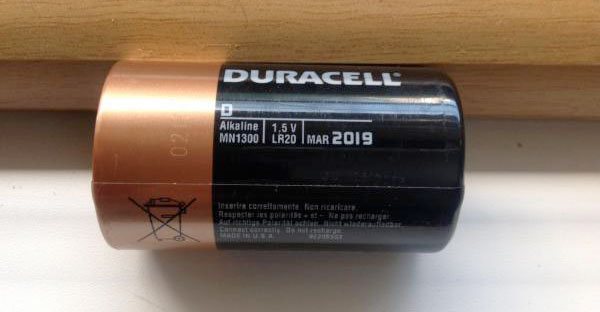

If the batteries are low, there is not enough electricity to quickly create a spark to ignite. In this case, the crackling sound is longer. During the time until the flame is ignited, too much fuel has time to accumulate in the working area.
Replace the batteries with new ones. You should purchase expensive alkaloid models from popular manufacturers.
What is the cause of column pops and how to fix them
- gas is supplied to the burner;
- using an igniter or piezoelectric element, the gas-air mixture is ignited;
- the circulating water in the coil above the burner is heated and supplied to the draw-off points;
- after closing the tap, the burner goes out.
Cotton occurs due to the fact that during ignition, before ignition, a large volume of gas accumulates in the combustion chamber. Unpleasant sounds indicate serious problems in the operation of the water heater or related equipment and the smoke exhaust system.
Traction problems
Poor draft is one of the main reasons why the geyser pops when turned on. If the chimney is in a normal state, after the gas is started up, its excess is simply removed from the combustion chamber with natural air circulation. Checking the presence of traction is quite simple.
There are special holes in the column casing. To ensure the presence of normal traction to the channels, you can:
- put your palm;
- lean against a sheet of paper;
- bring a burning match, the flame will deflect to the side, and not just slightly shake.
Insufficient air circulation occurs due to clogging of the smoke channel with soot, dust and dirt, the collapse of a part of the brickwork. Malfunctions in an apartment building are eliminated by the housing office, the staff is usually a stove-maker, or a contractor company that has entered into an agreement with tenants for service.
Low batteries or faulty power supply
If cotton occurs when the gas column is started, after a long operation of the igniter, the reason is rather the following:
- Dead batteries - a consequence: there is no stable spark. Repair: installation of new batteries.
- Microswitch problems - the module is connected to the control unit. It is this part that is responsible for the signal that the water is turned on and it is necessary to ignite the burner. The main cause of the malfunction: oxidized contacts. Repair: microswitch replacement.
You should not immediately call the wizard when the column starts up slowly, accompanied by claps. First you need to replace the batteries. In about 80% of cases, the water heater will work normally.
Jet problems
Fault catalyst: clogged nozzles. It is enough to clean the outlets on the burner and igniter and the column will continue to operate normally. When performing maintenance, do not unscrew the jets. Cleaning is performed with a special awl with a rod identical in size to the outlet.
Lack of air in the room
The problem arises after the installation of reinforced-plastic windows. PVC windows are completely sealed and prevent normal air circulation in the kitchen. As a result, due to a lack of oxygen, a pop is heard when the gas column is turned on.
Another problem is related to the fact that SNiP is violated when installing the door to the kitchen. The door leaf adheres to the lower sill, preventing the flow of fresh air.
Solution to the problem: installation of supply valves on a metal-plastic window. On sale there are special ventilation grilles for installation on the door leaf.After the necessary air circulation in the room is restored, the column will start working without failures.
According to SNiP, at the bottom of the door leading to the kitchen with a gas water heater installed, it is necessary to provide a 5 cm gap between the floor and the canvas.
Incorrect pilot position
Problems with the ignition of a gas water heater occur when the spark plug is incorrectly positioned (automatic dispensers). The igniter slides down due to thermal deformation resulting from constant heating / cooling. The optimum distance between the candle and the burner is 4-5 mm.
It is not difficult to adjust the igniter yourself. The candle is attached to the body of the water heater with just one bolt.
Several other reasons
There is a general rule - there are no pops in the gas water heater, which is working properly. Water heaters with a turbocharged burner (closed combustion chamber) also do not face this kind of malfunction. The flame in a serviceable atmospheric gas water heater ignites smoothly without unnecessary noise.
In addition to the reasons described above, several more malfunctions can provoke pops:
- the formation of air jams in the smoke channel;
- failure of the ignition retarder.
Regardless of what exactly caused the malfunctions, it is better to contact the gas service for repair.
Reason 3 - Clogged nozzle
In semi-automatic models with piezo ignition, the main flame is ignited from the wick (the reasons why the wick of the Demrad gas column does not ignite are described here). If it is clogged or located incorrectly, then the intensity of its combustion may be insufficient for timely ignition.
It should be cleaned. For this, the casing is removed and the orifice of the jet is cleaned with a thin wire. You should also check that it is correctly positioned and, if necessary, move it closer to the burner. When the wick is on, its flame should go over the edge of the burner.
Ignition wick columns
Why the gas water heater turns on with a clap did not bother the owners of old water heaters too much. Their design and operation were not as convenient as compared to modern equipment. But fixing them was much easier and cheaper.
In this case, cotton when the gas column is turned on is possible if the ignition wick is in the wrong position. The device bangs due to the fact that the flame has decreased and cannot reach the edge of the burner edge. This is due to insufficient gas supplied to the wick. The main reason that the water heater makes noise is considered to be a clogged nozzle.


You can cope with this problem yourself, the main thing is to be able to completely disassemble the device. The diagram of the device of instantaneous water heaters is similar, so the instruction will be suitable for each device.
To cope with the breakdown and prevent the explosion of the gas column, it is necessary to act in the following sequence:
- Shut off the water and gas supply to the equipment.
- Dismantle the protective cover.
- Open access to ignition fuse.
- Unscrew the fasteners from the guide tube and remove the nuts securing the sensors and feed tubes.
- Pull the tee out of the groove.
- Pay attention to the lower connection. A small screw with a hole through and through will be visible at the bottom. It is called a jet.
- Pull the element out of the tube and clean it thoroughly. To do this, you can use a thin wire and a needle.
- After completing the procedure, all parts must be reassembled.
After completing these steps, the popping in the water heater should stop. Having found out why the gas water heater is making noise, you just need to fix the malfunction. If the breakdowns are complex and the noise in the device increases, it is necessary to visit a specialist. He will do everything to prevent the column from exploding and to function normally.


jasonwoodhead23, flickr.com CC BY
A common malfunction of gas water heaters is cotton when turned on. It’s just annoying at first, but gradually the claps get louder. If you do not pay attention to this, then one day, which is far from being a fine day, it may “pop” so that glass will fly out or the chimney will fall apart. Therefore, the problem with the cotton of the gas water heater must be solved as quickly as possible.
Cotton when turned on more common in old-design gas water heaters with a constantly burning wick. In new columns with automatic gas ignition, such a malfunction also happens, but much less often. The main cause of cotton is later gas ignition in the main burner. The gas has time to accumulate in the cavity of the heat exchanger and mix well with air. In severe cases, the gas-air mixture fills the flue pipe and part of the chimney. When, finally, the flame of the wick or the spark of the ignition device ignites the gas, a small volumetric explosion occurs. A serviceable gas water heater of any design must ignite softly, without pops and flame emissions from under the casing.
What Causes Cotton?
The main faults that result in a pop when turned on include:
for all types of gas water heaters:
- lack of draft in the chimney or insufficient draft
- insufficient supply of fresh air to the room
- ignition retarder malfunction
for gas water heaters with a wick:
- incorrect position of the ignition wick flame
for gas water heaters with automatic ignition:
- discharged power supplies of the control unit
- malfunction of the microswitch in the water block
- incorrect position of the spark plug
How to eliminate cotton when turning on the gas water heater?
First of all, you should check chimney draft... For this, most gas water heaters have special holes in the casing. In the absence of such holes, the draft can be checked at the gap under the smoke hood or directly in the chimney through the cleaning hatch. Good traction is felt with just the palm of your hand. A weaker thrust, but quite sufficient for the operation of the gas column, is detected by the deflection of the flame of a match or lighter. The flame must deviate significantly, not just shake. If there is no draft, then it is prohibited to use a gas water heater.
The lack of traction is usually caused by blockage of the canal by foreign objects or the collapse of a part of the canal. In such cases, the chimney must be restored and cleaned, this is the responsibility of the management company. You just have to remove the debris from the chimney through the cleaning hatch. If the chimney is in order, then in the afternoon with the help of a mirror you can see the light at the end of the chimney.
Draft may be absent even with a working chimney. Most often this is due to an insufficient flow of fresh air into the room where the column is located. Modern plastic windows are practically airtight and do not provide the necessary air exchange. To solve the problem, a supply valve is installed on the window. Also, to ensure proper air exchange, the kitchen door in houses with gas water heaters has a gap of at least 5 cm at the bottom; it is prohibited to close it up.
Cause 4 - Clogged openings of the main burner
If you want to know about which gas water heaters (instantaneous water heaters) should not be chosen, about the subtleties and nuances of their installation and connection, as well as hidden information on their correct maintenance of all manufacturers and models, then go here -.
But, we also have on this problem and not only, which in the first place you will not find anywhere, because it is asked by specific people who could not get more support and advice anywhere (which they themselves inform us about). And secondly, their problems are so complex that sometimes our expert Alexander Kholodov deals with people for 10 or more days.
And now EVERY user question and answer to it, in order to avoid money costs as a result of improper operation or repair of the flow heater. And here it doesn't matter which manufacturer's apparatus is involved in the issue. The only important thing is that unique situation, as a result of which this question arose, because as one good saying goes: "if forewarned, then forearmed."

